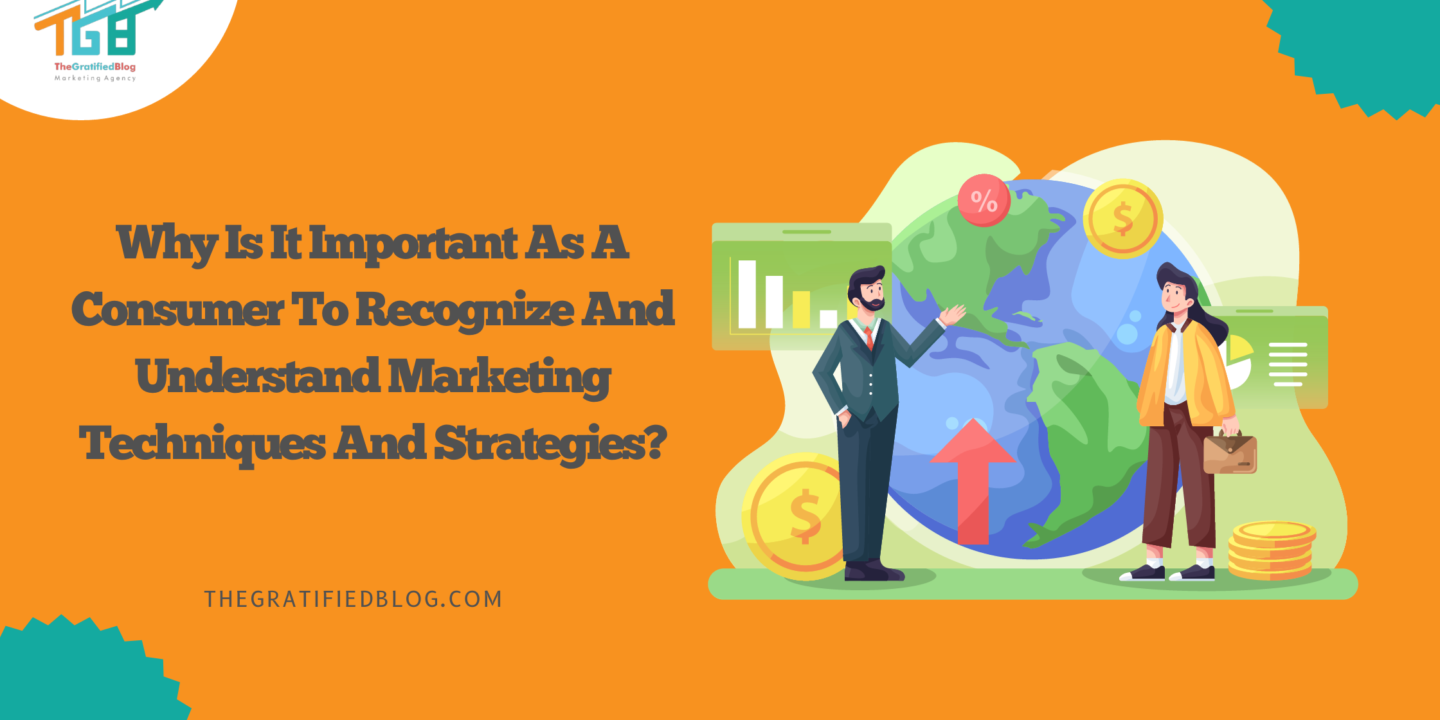
In a world inundated with advertising and information, being a discerning consumer is not merely an advantage – it’s a necessity. “Why Is It Important As A Consumer To Recognize And Understand Marketing Techniques And Strategies?” This question forms the core of our everyday choices, from the products we purchase to the services we select. Marketing functions as the unseen force that shapes our decisions, making it crucial for us, as consumers, to unravel the methods behind the marketing madness.
In this blog, we will delve into the significance of being a savvy consumer who can see through the smokescreen of advertising and comprehend the psychology behind marketing strategies. By immersing yourself in the realm of marketing and emerging with a better understanding of its techniques, you’ll be empowered to make more informed choices, save money, and contribute to a marketplace driven by accountability and innovation.
So, let’s get started:
Why Is It Important As A Consumer To Recognize And Understand Marketing Techniques And Strategies?
The answer is simple: It educates individuals, enabling them to make well-informed choices regarding their purchases and, ultimately, shaping their consumer behavior.
Now that you know why it is essential, let’s delve deeper into this answer, breaking it into its key components to understand why consumer education about marketing techniques and strategies is paramount.
The Power Of Education

Education is often described as the most potent weapon to change the world. That holds even in the context of consumer behavior and marketing. Informed consumers can shape markets, promote responsible business practices, and make choices that align with their values.
Let’s look at seven reasons why education is the key:
Avoiding Deceptive Practices
In the marketing world, businesses often employ various strategies to make their products or services appear more enticing than they may be. These tactics range from clever advertising that exaggerates benefits to concealing a product’s or service’s downsides. As consumers, being aware of these tactics is like having detective skills that enable us to see through the smokescreen.
This awareness empowers us to make decisions grounded in genuine needs and desires rather than succumbing to the allure of misleading marketing. By recognizing these tricks, we can avoid being swayed by deceptive practices, ultimately making choices that better align with our natural preferences.
Empowerment
Education about marketing is akin to receiving a superpower in the consumer world. It equips individuals with the ability to see through the persuasive techniques companies use to convince them to make purchases. This newfound understanding boosts consumer confidence, allowing them to evaluate products or services critically.
Instead of impulsively succumbing to marketing ploys, educated consumers can ask themselves whether they genuinely need a particular item or if their desires are being artificially stoked by advertising. This heightened sense of control over their choices prevents impulse purchases and ensures they don’t acquire items they don’t want or require.
Savings
Learning about marketing isn’t merely about self-protection; it’s also a tool for saving money. When consumers can identify the pricing strategies and sales tactics businesses employ, they are less susceptible to falling for these tricks.
By recognizing these tactics, individuals are less likely to be convinced to purchase products at inflated prices, and they can also steer clear of the enticing yet unnecessary add-ons often pushed through upselling. This knowledge ultimately results in monetary savings and more economically sound decision-making, allowing consumers to keep more money in their wallets.
Health And Safety
Understanding marketing claims can have life-altering consequences in specific industries, such as healthcare and food. Being able to distinguish between genuine health benefits and mere hype is a matter of personal safety.
When consumers can evaluate health-related claims, they are better equipped to make decisions directly impacting their well-being. Differentiating between real health benefits and deceptive marketing ensures that consumers can safeguard themselves and their loved ones from potentially hazardous choices.
Ethical Considerations
Ethical business practices and corporate responsibility have gained significant importance today. Understanding marketing strategies enables consumers to differentiate between authentic claims and instances of “greenwashing” – when companies make false eco-friendly or socially responsible claims for marketing purposes.
With this knowledge, consumers can use their purchasing power to support businesses that genuinely uphold their values, contributing to a more ethical and responsible business landscape.
Market Competition
Recognizing marketing techniques shields consumers from manipulation and helps them identify when a genuinely competitive market exists. Informed consumers can play a crucial role in sustaining healthy competition by deliberately choosing products from various manufacturers.
This practice keeps companies on their toes, compelling them to improve product quality and affordability. In essence, educated consumers indirectly stimulate a market where businesses must continually strive to meet consumer needs better.
Critical Thinking
Education about marketing acts as a catalyst for enhancing critical thinking skills. It trains the mind to scrutinize information, discern reliable sources, and make logical, well-informed choices. With this understanding of marketing, individuals are less susceptible to being swayed by emotional appeals or misleading claims.
Instead, they become more critical and rational decision-makers, which benefits them in their shopping endeavors and translates into better judgment in various aspects of life. By honing their critical thinking skills, consumers can assess information, evaluate its credibility, and make well-reasoned choices, ultimately empowering them to interact with the world.
Understanding Marketing Techniques

Now that we understand the power of education, let’s delve into the importance of comprehending marketing techniques. Marketing comprises a broad spectrum of tactics, and consumers should be aware of the most common ones:
Advertising And Promotion
Recognizing advertising methods is crucial in the modern consumer landscape. Whether it’s a television commercial, a radio jingle, an online banner ad, or a clever social media campaign, advertising is all around us. Understanding the various forms of media used in advertising helps you become more aware of how information is presented to you. Different media have different strengths and weaknesses, and marketers use these to their advantage.
For instance, TV ads can use visuals and sound to create strong emotional connections, while online advertisements can be precisely tailored according to one’s browsing history. By knowing these techniques, you can better assess the impact of advertising on your choices and make more informed decisions.
Product Packaging And Presentation
The visual presentation of a product plays a crucial role in influencing consumer perception. Companies invest significantly in packaging and presentation because they understand that first impressions matter. The colors, fonts, imagery, and overall design of a product’s packaging can convey a sense of luxury, practicality, or eco-friendliness, affecting how you perceive the product’s value.
Understanding how these aesthetics influence your perception empowers you to look beyond the surface and make choices based on the actual quality and utility of the product rather than its visual appeal.
Pricing Strategies
Companies employ various pricing strategies to entice consumers. These strategies include bundle pricing (where products are sold together at a discount), psychological pricing (where prices are set just below round numbers to appear more affordable), and loss leaders (Where items are offered at a cost lower than the actual value to entice customers who may buy other items).
Recognizing these pricing tactics can save you money and help you avoid overpaying for products or buying unnecessary items just because they are bundled with something you genuinely need. Understanding pricing strategies gives you the upper hand in assessing the actual value for your money.
Social Proof And Testimonials
In the age of online shopping, social proof and testimonials have become powerful tools. Many consumers rely on customer reviews and endorsements to make their purchasing decisions. However, it’s essential to recognize that these can be manipulated. Companies may post fake reviews or cherry-pick positive feedback to create a rosy picture of their products.
Being aware of this manipulation is crucial to prevent falling for false claims. It’s essential to look for authentic and unbiased reviews and consider the general agreement rather than being swayed by a handful of overly optimistic testimonials. Doing so lets you make more informed and reliable decisions when choosing products and services.
Emotional Appeal
Marketing campaigns often use emotional appeals to connect the consumer and the brand. Emotional marketing can tap into feelings of joy, nostalgia, empathy, or even fear to make products and brands more relatable. Recognizing emotional manipulation is essential to making rational decisions.
When you know the emotional tactics being used, you can step back and evaluate whether a product genuinely meets your needs and whether your emotional response is genuinely evoked or manufactured by marketing. That helps you make decisions based on reason rather than emotional impulse.
Digital Marketing And Big Data
In the digital age, personal data is a valuable resource for advertisers. Many online platforms use data-driven targeted advertising to tailor ads specifically to your preferences and behaviors. Understanding how this works can help you protect your privacy and have more control over the information you share online.
By recognizing that your data is being collected and used to create personalized ads, you can make more informed choices about what information you share online, how you manage your privacy settings, and whether you want to support businesses prioritizing your data security and privacy. This understanding empowers you to navigate the digital landscape more consciously and safely.
Driving Buying Behavior
Once consumers are educated about marketing techniques and strategies, their buying behavior changes in several fundamental ways:
- Informed Choices: When consumers are well-informed about marketing techniques and strategies, they become more rational decision-makers. They’re less likely to make impulse purchases driven by flashy advertisements or emotional appeals. Instead, they take the time to gather information, compare options, and carefully consider their needs and preferences. That leads to more thoughtful and satisfying purchases. Informed choices are not based on what’s trendy or what marketers want you to buy; they’re grounded in understanding what genuinely suits your requirements, leading to greater contentment with your purchases.
- Brand Loyalty Based on Value: Consumers knowledgeable about marketing can form brand loyalty that goes beyond superficial advertising. Instead of unthinkingly following the latest marketing trends, they assess brands based on value for money, product quality, and alignment with their personal preferences. In other words, they focus on what a brand delivers rather than what it promises in a flashy ad. This kind of brand loyalty is more durable and meaningful, rooted in genuine satisfaction with a product or service, not just its marketing hype.
- Market Accountability: Informed consumers are not passive players in the marketplace. They are vigilant watchdogs who hold businesses accountable for their actions and marketing claims. When they understand marketing techniques, they can spot a company making misleading claims or engaging in unethical practices. In response, they demand transparency, ethical conduct, and authenticity from businesses. This level of accountability fosters a healthier marketplace where companies are encouraged to be more honest and responsible, knowing that consumers are watching closely.
- Market Innovation: Educated consumers play a pivotal role in driving market innovation. By supporting businesses prioritizing innovation and meeting consumer needs, they stimulate improvements in the available products and services. These consumers push companies to innovate continually, creating products that are more efficient, sustainable, and responsive to the evolving demands of the market. In this way, educated consumers help shape a marketplace driven by innovation and progress rather than stagnant or profit-driven practices.
FAQs
Q1. As a consumer, why should I learn about marketing techniques and strategies?
A. Understanding marketing helps you make more informed decisions when buying products and services. It empowers you to avoid deceptive practices and make choices aligned with your needs and preferences.
Q2. What are some standard marketing techniques I should be aware of?
A. Standard marketing techniques include advertising and promotion, product packaging and presentation, pricing strategies, emotional appeals, social proof (testimonials and reviews), and the use of big data in digital marketing.
Q3. How can recognizing marketing techniques save me money?
A. By understanding pricing strategies and sales tactics, you will likely avoid falling for inflated prices or unnecessary upsells. This knowledge allows you to make more cost-effective purchasing decisions.
Conclusion
Now that you understand why it is essential as a consumer to recognize and understand marketing techniques and strategies? It’s time to put this knowledge into action. Equip yourself to make informed decisions, safeguard your financial interests, and contribute to a more responsible and competitive marketplace.
Start investing today in your consumer education, and you’ll find yourself making wiser purchasing decisions and influencing a world where transparency and innovation flourish. Your path to acquiring more excellent knowledge and becoming a vigilant consumer begins now.
If you still have any questions related to the blog, then feel free to leave them in the comments section. We will be happy to answer you.
Thanks for reading. 🙂








No Comments